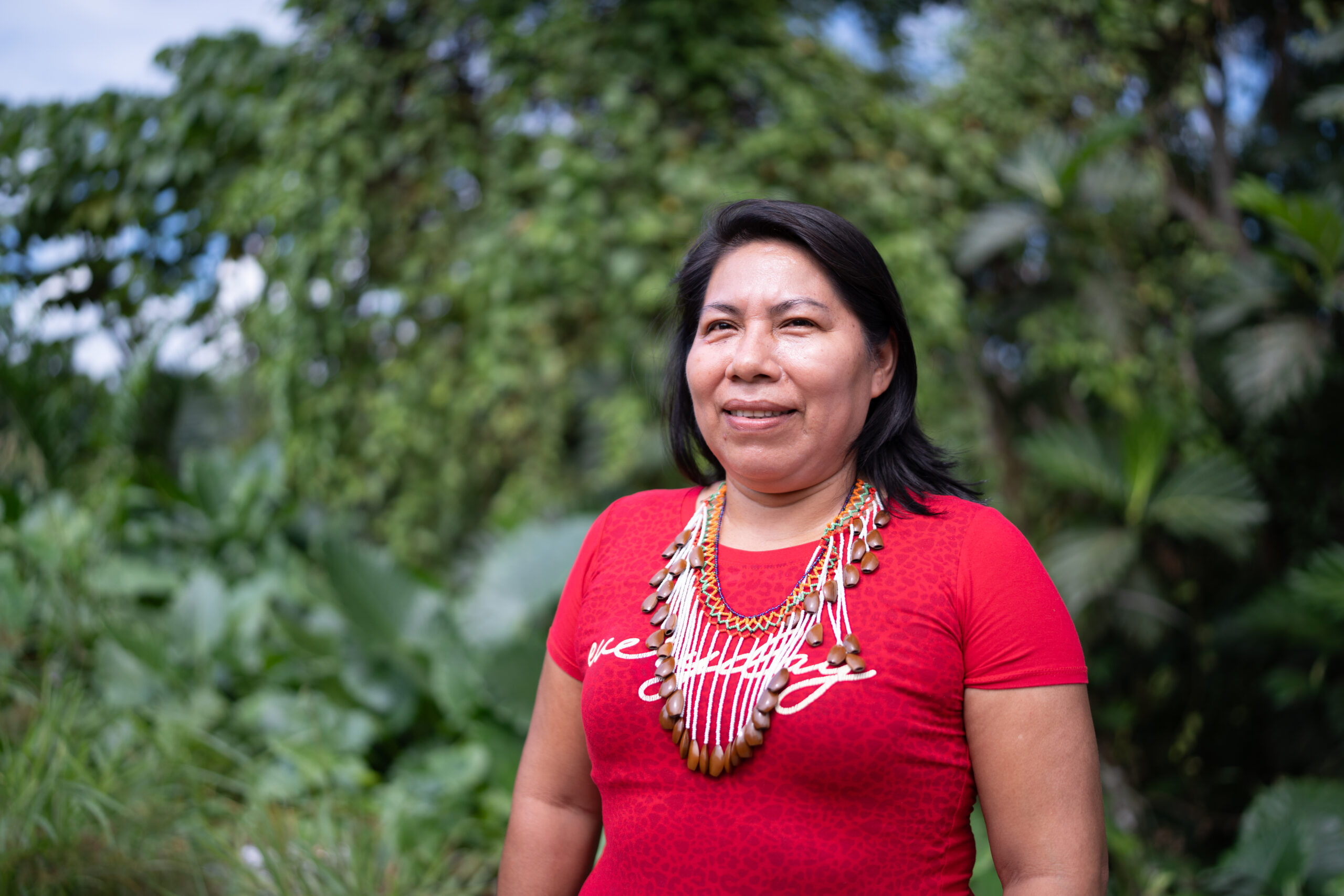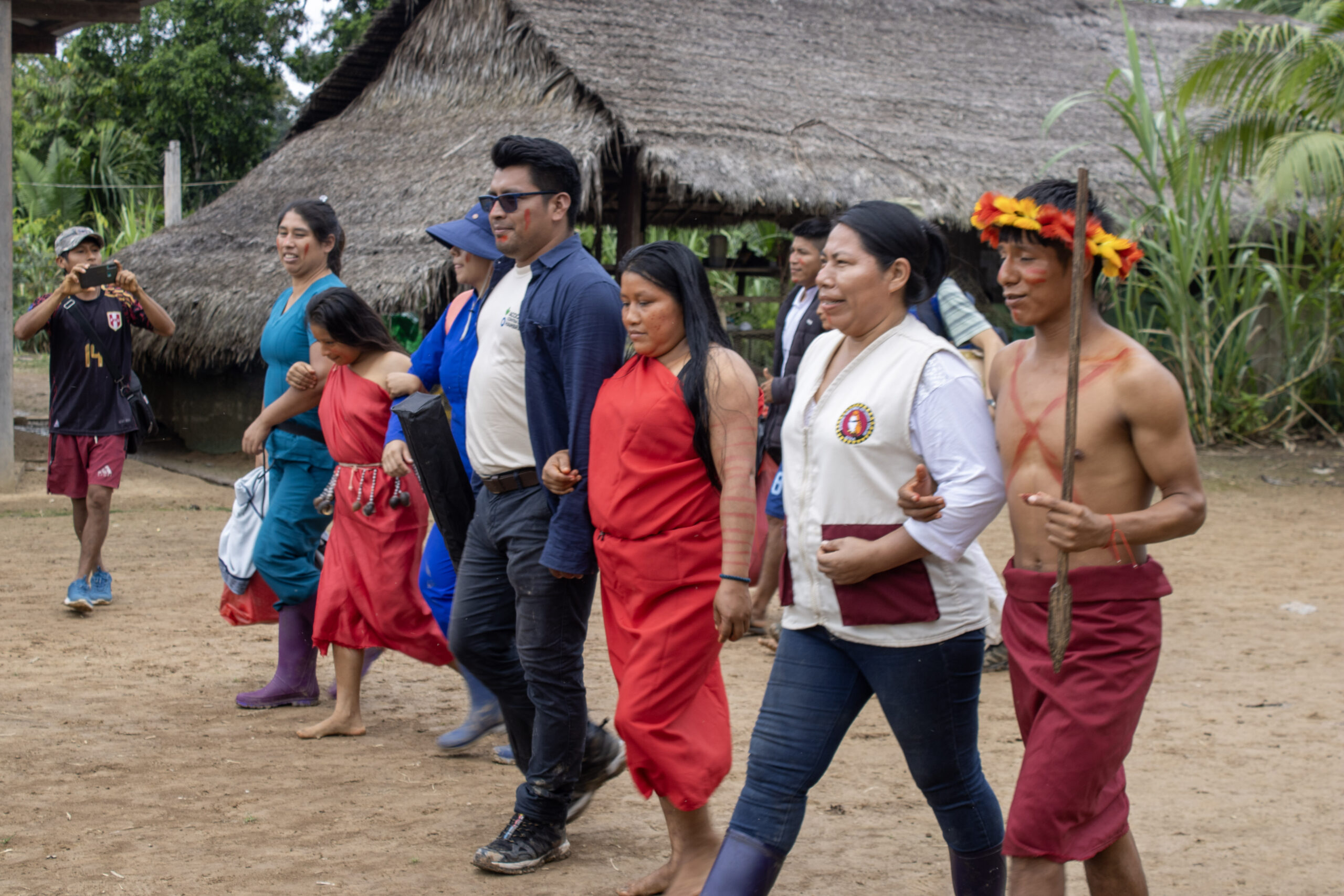
A teacher, leader, and the first woman to serve as waisam (vice-president in Awajun) of the Awajun Autonomous Territorial Government (GTAA), Matut Impi is championing the role of women in indigenous governance and decision-making. This Women’s Day, we celebrate her story to honour the transformative work women like her are doing globally—breaking barriers, creating change, and shaping the future.
Hailing from the Belén indigenous community in Amazonas, Peru, Matut has dedicated her life to defending the rights of the Awajun people from a young age. Today, she holds the historic role of the first female waisam (vice-president in Awajun) of the Awajun Autonomous Territorial Government (GTAA), a key body in Peruvian indigenous governance. The GTAA protects nearly 3 million hectares of land and represents around 70,000 people across the Amazonas, Loreto, San Martín, and Cajamarca regions.
As an indigenous leader, she proudly represents women and is committed to preserving the Awajun language, worldview, and ancestral knowledge. She also works tirelessly to improve access to education and health while strengthening the family economy through sustainable practices.
The woman behind the role of waisam
Matut’s journey into leadership was inspired by her father, a teacher in Amazonas. “I admired the way he taught, and I often mimicked him when I played with my little neighbour. We had a blackboard at home, and I would pretend to be the teacher, while she was my student,” Matut fondly recalls.
Although she initially studied computer science, Matut’s passion for teaching led her back to education, and she graduated as a teacher in 2002. She instilled pride in her students for their culture while sensitively addressing pressing community issues. “For my father, teaching wasn’t just about academics; it was about sharing our knowledge. As a teacher, I was able to raise awareness among children and young people about environmental protection, food sovereignty, and indigenous struggles,” she reflects.
In 2015, Matut moved to Lima to pursue further education. Despite being over 1,300 kilometres from her home, she remained deeply connected to her roots. In 2016, alongside other Awajun living in the capital, she co-founded the Awajun People’s Association in Lima (Ajutap), where she was elected vice-president. Later, she joined the Centre for Interpretation and Translation of Indigenous Languages of the Peruvian Ministry of Culture, where she continued to advocate for the preservation of indigenous languages. During the COVID-19 pandemic, Matut moved back to Amazonas, working as a remote Awajun interpreter from Santa María de Nieva, the closest city to her natal community. During this time, she made sure to visit her family in the Belen community, where she also remained active in the Federation of Awajun Communities of Santiago River (FECAS), an organisation she’d been supporting in various capacities since 2010.
By 2021, the GTAA was still forming, finalising its consultations with the communities of Amazonas, Loreto, San Martín, and Cajamarca regarding its statute. In December of that year, Matut was invited to the official assembly for the establishment of the GTAA, thanks to her experience as a teacher and her active involvement in various public and private initiatives as a leader, vice president of the Ajutap Association, and a member of FECAS. During the assembly, she was elected waisam (vice-president) with overwhelming support from women in the organisation.

Paving the way for Awajun women
Becoming waisam marked a significant turning point in Matut’s life. The responsibility meant putting some of her personal projects on hold to dedicate herself fully to the leadership role. “I took on this responsibility with great commitment to continue opening spaces for participation so that girls and women could be involved in decision-making,” she explains. Though new to this level of leadership, she received the strong support of the pamuk (presidents) from the four departments that make up the GTAA. She moved from Santa María de Nieva to Chiriaco, where the GTAA headquarters are located. “At the start, the pamuk and I had no resources, but we made do with what we had, using our education and writing skills. Eventually, we were able to find resources to hire staff,” Matut recalls. Her leadership has been instrumental in advancing women’s participation in governance. One of her most significant achievements was the creation of the Awajun Women’s Dialogue Congress of the GTAA, which, since 2022, has served as a platform for women to identify challenges and propose solutions for their communities. “The first thing we did was to convene meetings with women from the four departments to discuss what we can do to strengthen ourselves,” she says.
By the end of 2024, this Congress had developed nine ordinances aimed at improving bilingual education, promoting reforestation, preserving language and culture, and strengthening sustainable livelihoods. “One of the ordinances we passed focuses on continuing education for girls who, after finishing primary school, often do not have the opportunity to continue their studies. We want those who are interested to continue, and we want their parents to motivate them,” Matut explains.
The ordinances also address critical issues like the freedom of women to choose their partners, strengthening food security through sustainable farms , and achieving legal recognition of marriages performed in Awajun communities.
Towards Tajimat Pujut: Alliances for a better living
The northern Amazon faces significant challenges, including illegal mining, deforestation, and oil spills, which have polluted ecosystems and impacted communities. In response, the GTAA has forged strategic alliances to strengthen its indigenous agenda, protect territories, preserve culture, and promote sustainable economic alternatives—working toward the Awajun concept of Tajimat Pujut (“Good Living” or “living without needs”).
Since early 2024, the GTAA has been part of the Biodiverse Landscape Fund – BLF Amazonian Andes project, an initiative supported by UK International Development, led by Practical Action implemented by a consortium of partners from Peru and Ecuador, which includes the Interethnic Association for the Development of the Peruvian Rainforest (AIDESEP). This project seeks to strengthen indigenous organisations in protecting their rights and the governance of their territories. The GTAA’s women’s agenda is receiving support through technical advice from AIDESEP, Practical Action and their partners. This collaboration contributes to strengthening women’s leadership, promoting new livelihood sources for women such as bio-jewellery and ceramics, encouraging the preservation of ancestral techniques, and rallying for the value of their homeland and cultural roots.

A legacy of leadership
Despite progress, Matut recognises that there are still challenges to overcome in ensuring greater participation of women in decision-making. “We want women to be prepared to express themselves and participate in their communities. We want them to help each other organise, find alternatives, and strengthen their economies,” she says.
Reflecting on her journey, Matut hopes her efforts will leave a lasting legacy. She aims to sow the seeds of leadership in Awajun women and youth, inspiring them to continue their work in their communities and organisations and persist in defending indigenous peoples’ rights and territories. “We must fight with conviction, work for our people, maintain our determination, and follow the Awajun principles,” she concludes, embodying the spirit of both an educator and a leader.
The struggle for equity and a bright future for women within their own cultural worldview is led by women like Matut—but it is a cause that should call to all of us. Her story is a powerful reminder to accelerate action and funding that will support women like her as they work to bring about lasting change. By rallying behind them, we can continue building a future of equality across cultures and across the world.